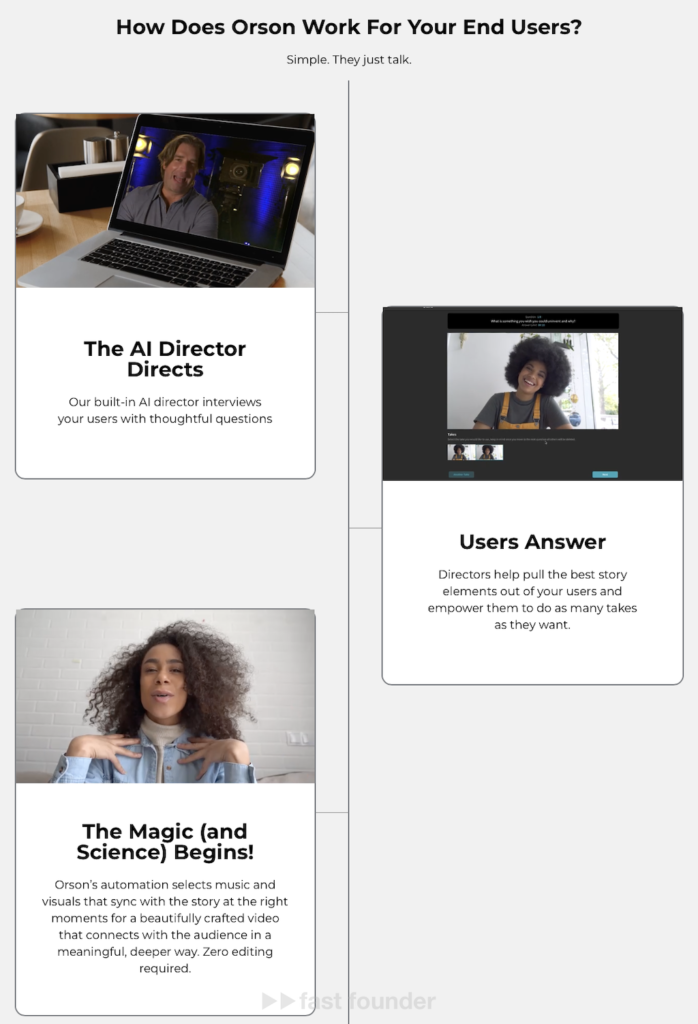You can’t get an insight by offering to choose an answer from a list. Insight can only be caught in the process of communicating with the consumer. But communicating with consumers is too long and expensive 🙁 It was long and expensive! Because AI has emerged capable of taking on this work. The time has come to create AI interviewers. And here are different examples of how they can be used — so that people would pay for it.
The Essence of the Project
Marketing is not just about advertising. A crucial part of marketing is studying consumers in the preparation phase for launching a new product, as well as collecting feedback on a product that has already been launched.
To gain real insights during such research, simple questionnaires with the option to choose one of the answers are clearly not enough — it’s necessary to ask ‘open’ questions, to which users can give any detailed answers. But here arise two problems.
Firstly, people are reluctant to answer open questions, they really need to be interviewed to achieve a reasonable number of substantive responses — and this requires money to hire a large number of interviewers and time to conduct the interviews.
Secondly, the results of such interviews need to be processed manually to extract meaningful information from the users’ stream of consciousness, which then needs to be structured and analyzed. And such processing again requires people, meaning time and money.

Outset — a platform that can interview consumers on its own and process the results of these interviews using AI.

The first thing to do is to set the format for the future research:
- choose the type and character of the AI interviewer (level of meticulousness, friendliness, empathy, pace of conversation),
- formulate a list of questions that the interviewer should get answers to,
- give the interviewer additional instructions that he should follow in the conversation.
Interviews can be conducted in the form of text chat, voice interview, or video session.

After this, a list of contacts with whom the interviews need to be conducted is uploaded to the platform — and it will start reaching out to users to initiate the conduct of at least 1,000 interviews simultaneously, in any language.

The feature of the AI interviewer is that it does not just ask questions to users and wait for their responses. It tries to stir them up and provoke an open conversation, using the same techniques that live interviewers use. If the AI interviewer finds the answer too superficial, it will ask additional questions to try to get to the true reason for the respondent’s reaction.
Thus, the AI interviewer achieves a much higher conversion rate in responses than with a simple distribution of questionnaires with open questions — when the best case scenario for 1,000 distributed questionnaires is a couple of dozen substantive responses.

The platform also analyzes the recordings of conversations itself — compiling brief summaries of each conversation, highlighting key moments from each talk, grouping them together, and summarizing the number of responses in each resulting group.
In addition, the platform separately collects the most successful statements from consumers, which can then be used to describe the product or formulate marketing messages.

In the course of the conversation, the AI interviewer can not only ask questions but also show the interlocutor pictures or videos — for example, with concepts of future products, and then ask questions about these concepts.
Outset can be integrated with all popular platforms used by agencies that supply people from target consumer segments for market research. Thus, Outset’s AI interviewers easily fit into the usual business processes of conducting surveys.

The startup is still at an early stage, so they are currently only talking about 15 corporate clients who have started using their platform for research.
Despite this, the startup has now raised a new $3.8 million in investment, adding to the $1.1 million they attracted at the beginning of summer at the pre-seed stage.
What’s interesting
The AI interviewer is an interesting and somewhat unexpected application of AI technology. It may seem that today’s Outset has chosen a rather narrow market for itself. But this is not the case!

The size of the market research market is already large and continues to grow. It surged in 2017 from $44.42 billion to $66.37 billion. And by the end of 2023, it is expected to reach $83.93 billion.
The beauty of this market is that market research is usually conducted by quite large companies, while startups and small businesses rely mainly on intuition and the beliefs of founders 😉 Large companies mean large checks. Therefore, even with not a very large number of clients, significant money can be earned in this area, and on a fairly regular basis.

As an example, one can cite the startup Zappi. It conducts marketing research for major brands and has raised $192.7 million in investment, $170 million of which it attracted in the last round. In August of this year, an article already appeared in their blog about how AI can significantly increase the number of insights obtained during marketing research.

Another example is the startup Knit. At that time, they positioned themselves as a platform for conducting video interviews with Generation Z consumers and raised $5.6 million in investment for this.

Now their message has somewhat changed — they are already talking about “mass collection and analysis of feedback using AI”.
Thus, the use of AI in the large and growing market of marketing research is starting to become a trend.
By the way, using AI interviewers for conducting marketing research can significantly reduce the cost of conducting them — which can significantly expand the market of potential customers to the level of medium and even small companies. Thus, the range of opportunities for making money for companies conducting marketing research can greatly expand.
Moreover, the affordability and scalability of AI interviewers allow them to be used for solving other related and more mass tasks.

For example, the startup Orson used almost the same technology as Outset, but for collecting user video reviews — which can then be posted on their website or used in advertising.
Orson created what he called an “AI director” — which in a video session asks users questions about the product, and then cuts out the most successful pieces of the interview and edits them into short video clips with compelling user stories about the product. This startup raised 8 million dollars in investments.
Where to Run
The direction of possible movement is the creation of AI interviewers. The whole question is in which particular area to use them, that is, which product to create for their application.
The first two options, for which there are already examples to copy — are conducting marketing research following the example of Outset or collecting user reviews following the example of Orson.
However, there can be many more options. Immediately comes to mind, for example, a product to improve user retention.
The first way to use it is to “set” AI interviewers on users who have recently shown insufficient activity in the service. These robots can ask why this happened — what is unclear in the service, what is unsatisfactory, what does not work. These data can be passed on to the service owner for subsequent processing, or even immediately give the robot instructions on what to answer and advise users in standard situations.
The second way is to start asking users similar questions the moment they cancel their subscription to the service. Thus, it is possible to collect the reasons for the drop-offs, and also immediately offer something like discounts or bonuses to try to retain them at that moment.
The trick is that sending a letter to a user showing insufficient activity or deciding to stop using the service is not particularly effective.
A similar conclusion was reached by the startup Connectly, about which I recently wrote. It tries to solve the problem of abandoned shopping carts in online stores. Usually, in these cases, stores send emails to customers with reminders about the abandoned carts, but few people respond to them.
Therefore, the startup created an AI salesperson named Sophia, who contacts customers in messengers and tries to find out in a conversation why the customer did not buy the deferred items, and offers a discount or other more suitable items for purchase. The startup claims that this “conversational” approach provides a higher efficiency in bringing back non-buyers than simple reminder mailings.
What other applications of AI interviewers come to your mind, and in which areas?
